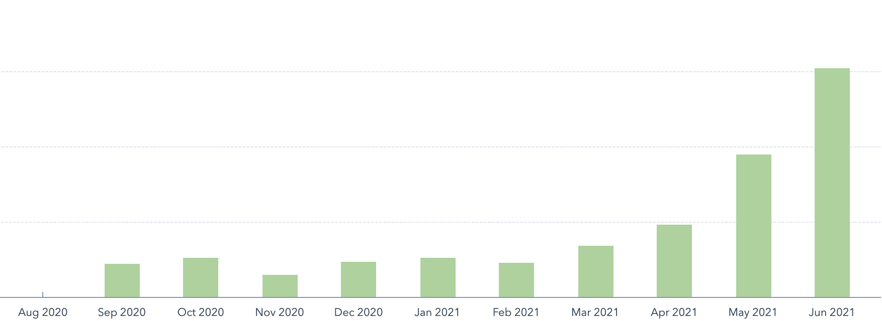A lot of startups don’t have someone focused on marketing early on. It’s usually just one of the myriad things one of the founders works on but isn’t able to dedicate much time to. There's rarely a dedicated marketer on the founding team.
But marketing is one of those things that takes a lot of time to pay off, and the more work you put into it early, the easier things will be as your company matures. And you never see that more clearly than you do with SEO.
SEO (or search engine optimization) is the foundation the rest of your marketing program is built on. It's incredibly important to start SEO work early on, because it takes a long time to build up search engine credibility, which you need to drive meaningful inbound organic search traffic.
I've been working on SEO since we started Gradient Works last fall. From the earliest days, I was doing foundational SEO work - creating content, writing blog posts, issuing our newsletter, pitching bylines, planning our keywords. All with the goal of preparing our site to eventually be discoverable in search engines, so that future potential customers can more easily find us when we're ready to sell them something.
And it's working. This chart shows inbound search traffic to gradient.works over the site's (short) lifetime. We're not even halfway through June 2021 yet, and we've already surpassed last month's search traffic, which was almost 2x the month before. You can see the compounding returns on our early SEO investment already. Now imagine this chart in 6, 12, 18 months*. It won't be long before half our website traffic is from organic search. (And while it's not the point of this post, this hopefully adds credence to my argument that every startup should have a marketer on the founding team.)

It's never too early to start SEO work. And though the best time to start thinking about SEO is 6-12 months ago, the next best time to think about it is right now.
So, what’s your job when it comes to SEO in the early days of a company, product or campaign? Your main objective is to build credibility with search engines so that when it comes time for people to actually find your website, they can. Here are a few ways to start SEO work, no matter how early it is.
1. Know your keywords.
Research the right keywords for your website. Think about the terms people might search for that would be a good fit for your product (even if it doesn't entirely exist yet). What search queries do you have a good answer to? Use keyword research tools like Moz, SEMRush and Ahrefs to research the exact keywords you may want to use. Understand what the terms are, what content is already showing up for those terms, and how you can fit into that landscape.
You want a combination of higher-volume competitive keywords and lower-volume long-tail keywords. You may have some very specific keywords that only see 10-50 searches a month, but if someone lands on your site from that term, you know they'll be a highly qualified prospect. You need to couple those with some of the higher-volume, more general search terms that will take longer for you to rank for.
2. Update your keywords regularly.
The earlier you start SEO work, the more often you'll need to update your keyword list. As your positioning solidifies, you'll learn about new keywords you can add to your plan. You may find new ways of searching for or phrasing terms you'd already thought of.
As you start to grow your search traffic, you'll learn more about what terms bring in traffic (or not), and how well that traffic performs. Use Google Search Console to see what keywords are actually bringing people to your site. Is that the kind of traffic you want to see? Are visitors from search performing the actions you want them to?
3. Check on your competitors.
Use those aforementioned keyword research tools to see how your competitors' SEO looks. What pages are bringing in traffic? What search terms? And what third-party sites are linking back to them? All of this intel can help you think about your own SEO targets. Look for holes in their keyword coverage, as well as ideas for other terms and sites you can incorporate.
4. Get those inbound links.
If you're writing targeted content, the right people will eventually find it. They'll want to share it from their website. And that's good - you want as many other high-quality sites as possible linking back to your site. But you can't wait for those to trickle in; you need to go out and find them.
Reach out to relevant online communities, newsletters, and blogs to pitch a contribute byline. Post relevant content on social and in communities where you participate. Email influencers with relevant links they could include in their content. Find ways to get your links on other sites. Existing sites with higher authority will help increase your search visibility.
5. Follow all the SEO rules.
Make sure your blog posts are long enough. Get your headlines the right length. Update meta descriptions. Make sure URLs match the keywords you’re targeting. Include backlinks. There's a lot of extremely simple but extremely essential block-and-tackle SEO techniques that will help your pages rank more highly. Don't skip them.
6. Do a little bit every day.
SEO builds on itself, so small updates over time will have a large long-term impact. Try to publish new content every week. Check in on your competitors and your keywords. Post to LinkedIn. Share your content around. Interact with others' content. Email other sites for link exchanges. Do a little bit every day, and you'll start to see the rewards.
7. Just focus on good content.
Ultimately, if you do make good content that is SEO-targeted, people will find it. Create unique, compelling content that provides value to readers. Write things that would be useful to you, in a way that a human actually wants to read. Don't automate content creation, cram posts full of keywords, or try to game the system. Be a good web citizen, and the rest will follow.
SEO takes time. A lot of time. So the earlier you start working on your SEO strategy, the better. Even dedicating just a little of your attention to it now will make a big difference 6 or 12 months from now, when you're focused on selling your new product to all these new organic inbound site visitors. Do your future self a favor and think about it now.
And if you're interested in more content about early-stage marketing, take a look at this post about marketing when you don't even have a product yet.
*Update from July 31, 2022: We've grown organic inbound traffic to be 70-80% of our monthly traffic. Look at this chart now:





